Intel Core i9-9900K 9th Gen CPU Review: Fastest Gaming Processor Ever
Why you can trust Tom's Hardware
Conclusion
Intel's Core i9-9900K answers several requests from the enthusiast community. It sports more cores, higher clock rates, and effective Solder TIM. The delayed 10nm process could be a liability as AMD works feverishly to respond with new 7nm processors. But for now, these 14nm++ CPUs are winners.
In the chart below, we plot gaming performance with both average frame rates and a geometric mean of the 99th percentile frame times (a good indicator of smoothness), which we then convert into a frame-per-second measurement. Bear in mind that we tested with a Nvidia GeForce GTX 1080 at 1920x1080 to alleviate graphics-imposed bottlenecks. Differences between our test subjects would shrink with higher resolutions.
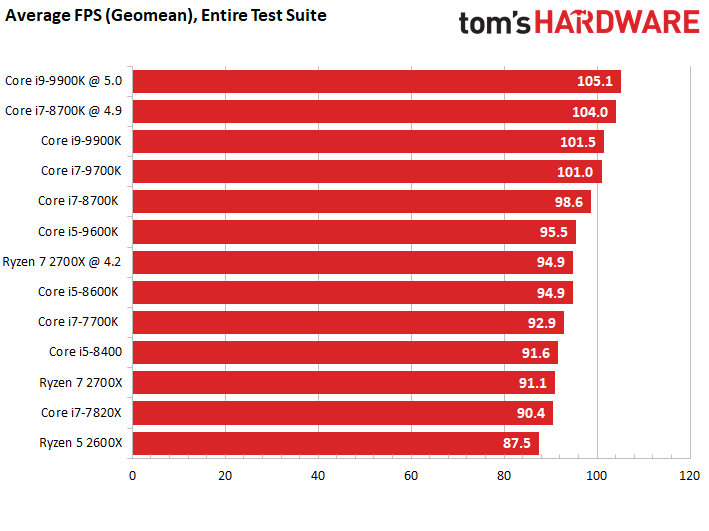
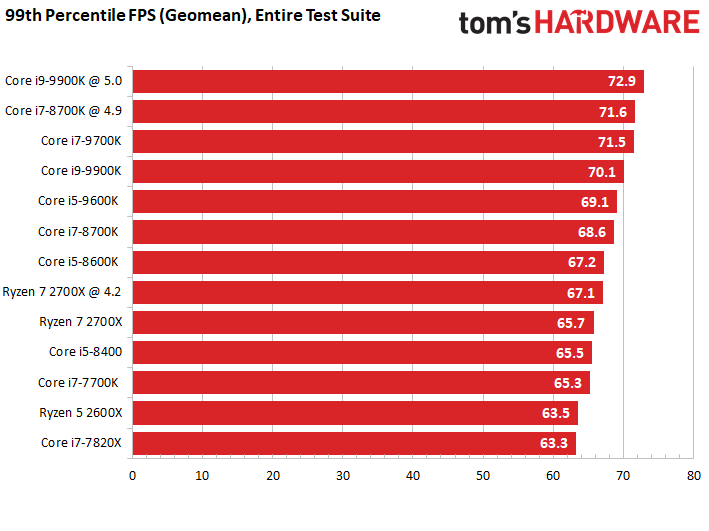
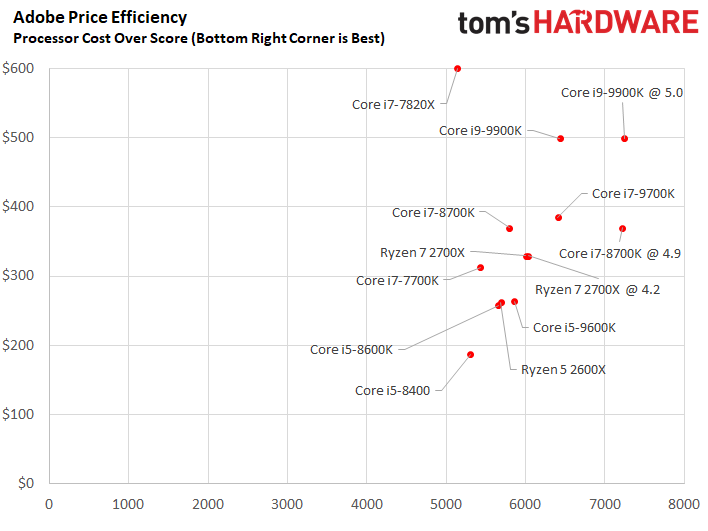
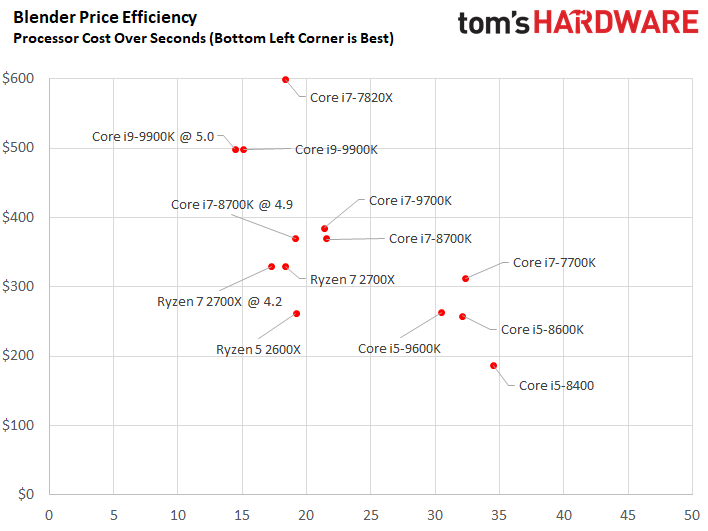
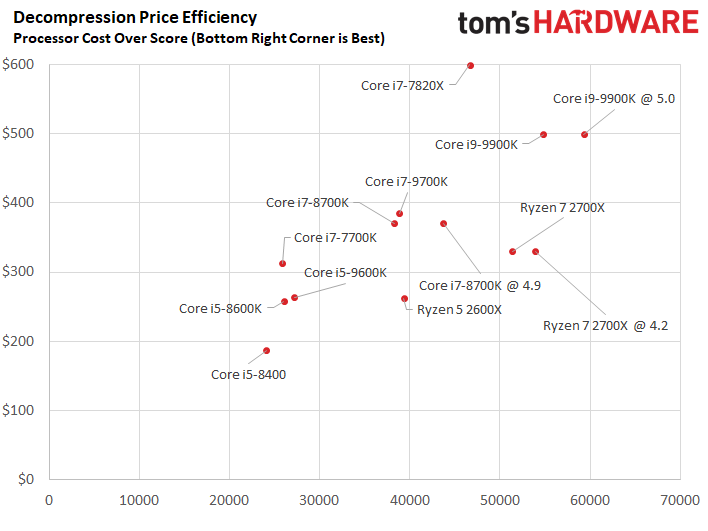
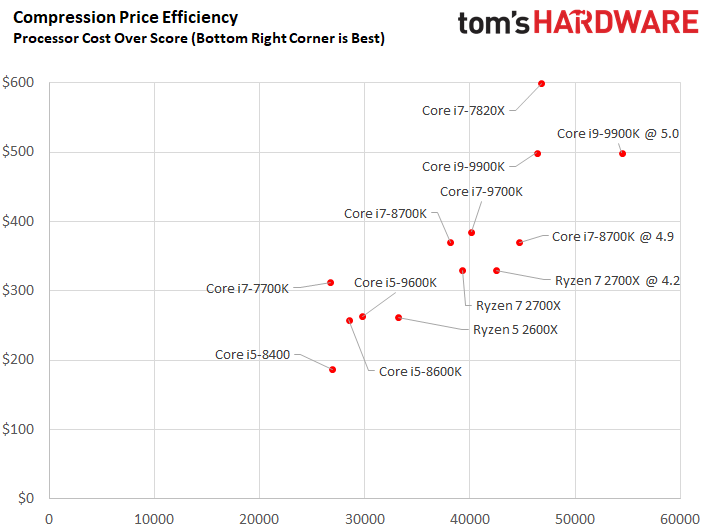
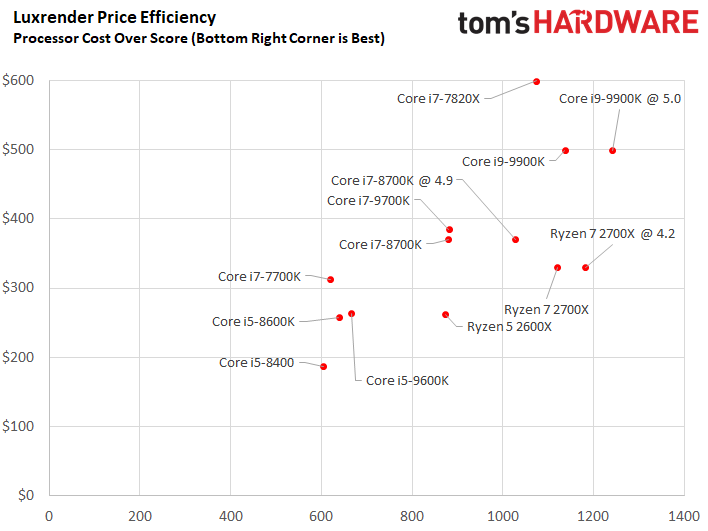
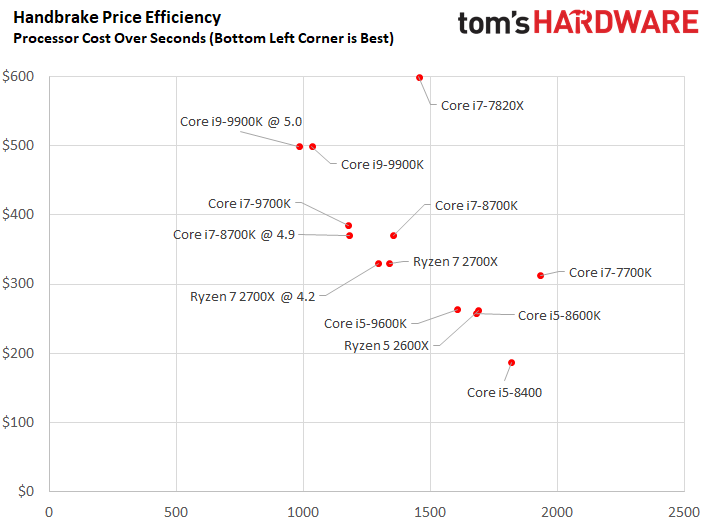
Core i9-9900K takes the crown as the fastest gaming processor on the market, and it proves to be highly capable in the threaded workloads that AMD's Ryzen processors used to dominate. Pricing is still a problem for Intel, though. You pay dearly for the extra cores, while a majority of games don't fully utilize them. The Core i7-9700K, even at stock settings, is competitive with the -9900K in most titles, especially considering the $115 you save by stepping down a notch. We haven't overclocked our -9700K yet, though, so the small deltas observed between the two chips may shrink further.
Although AMD's second-gen Ryzen processors narrowed the gap with Intel's Coffee Lake-based line-up, these ninth-generation Core chips redefine the playing field. The $263 Core i5-9600K at stock settings regularly beat an overclocked $329 Ryzen 7 2700X in games, and we expect even more performance from the Core i5 once we overclock it. Ryzen 7 2700X does come with a capable cooler, but the Core i5’s lower price diminishes AMD’s value proposition for gaming.
In the end, Core i9-9900K serves up impressive performance across our benchmark suite. If you regularly run heavily-threaded applications, it's probably worth paying a premium for. But if you need real workstation-class features, you should step up to an appropriate platform.
And make no mistake, the Core i9-9900K requires expensive accommodations. You need a premium motherboard with robust power delivery, particularly if you plan on overclocking. The -9900K can drop into existing Z370 motherboards, but we’re sure that many of them will struggle with the chip’s voracious appetite for current. Also plan on investing in a high-end PSU.
The -9900K proved to be an impressive overclocker, largely due to its Solder TIM. Don't think that means you can skimp on cooling, though. High temperatures hampered our overclocking efforts, and a more capable cooler could have facilitated additional headroom. Intel even threw in new packaging to help win back the hearts and minds of enthusiasts.
Get Tom's Hardware's best news and in-depth reviews, straight to your inbox.
Now the question is whether Intel can satisfy enthusiast demand. After all, we've already heard reports of delayed pre-order shipments. Even though the company assures us that it can accommodate demand for eight-core CPUs, this doesn't bode well for availability as the company grapples with an ongoing shortage of 14nm manufacturing capacity.
The Core i9-9900K has no direct rival on a mainstream platform, but its high price point encroaches into the realm of AMD’s upcoming $649 12-core Threadripper 2920X (which has hefty platform requirements of its own). That chip isn't available yet, so its performance remains shrouded in mystery. For something more readily available, look to the previous-gen Threadripper 1920X.
Unless you regularly use heavily-threaded applications, it’s hard to justify stepping up to Core i9-9900K from any modern four- or six-core CPU. With that said, Core i9-9900K is the fastest mainstream processor on the market. Plenty of enthusiasts opt for the best possible performance in both single- and multi-threaded workloads at any price. There, the Core i9-9900K doesn’t disappoint.
MORE: Best CPUs
MORE: CPU Benchmark Hierarchy
MORE: All CPUs Content

Paul Alcorn is the Editor-in-Chief for Tom's Hardware US. He also writes news and reviews on CPUs, storage, and enterprise hardware.
-
dlim389 "The better the cooling, the better power consumption"? What?! This doesn't make sense at all. You meant the better the cooling, the lower the temperature.Reply -
siman0 "Redefine" at double the price of a 2700x it needs to do more than that. The price diffrence is more than enough to go up another GPU tier ie 1070ti to a 1080ti. Id rather have more pcie bandwidth and the ability to upgrade my cpu till 2020. The only way Id recommend a upgrade to something close is if you already have the motherboard. But even then Id say the 9700k.Reply -
s1mon7 Wait, so it performs within a spitting distance of the 2700x with DOUBLE the power consumption and price? Holy smokes, I thought Intel will be able to easily take on AMD after they launch their 8-cores. I have to say that these results were very surprising to me, since I believed in this being the ace up Intel's sleeve. This is really interesting, and a big win for AMD. The 9900K goes through twice the power just to squeeze out that extra clock speed edge to outperform the 2700x by a mere 10%, at double the price, mind you.Reply
Intel clearly needs 10nm and a new architecture to go back into the game. As is, I struggle to think of any reason to buy the 9900k. -
TCA_ChinChin Interesting chip from Intel, but if you are looking at CPUs from a performance per dollar point of view, its rather disappointing. The real disappointment is the 9700k which is more expensive than the 8700k but performs basically the same on average.Reply -
Adrian Ocampo As a gamer, why would I buy a 9700K when an 8700K trades blows with the 9900K in both gaming and productivity. It just doesn't make sense. Its like its just competing with its own product as this point. I would be better off buying an 8700K deliding it, put liquid metal and overclock to 5.0Ghz for a much lower price than a 9900K.Reply -
gfaiii Guys just as a heads up you should say second generation 1151 socket, these are NOT compatible with 200 series boards that have 1151 sockets (without modding)Reply -
sonichedgehog360 Ladies and gentlemen, Intel’s FX 9000 series.Reply
(By the way, I totally saw this coming what with the crazy clock speeds they were pushing.) -
Johnpombrio I was surprised on how well the i9-9900K did on stock clocks. I may not even bother with overclocking as it does well even without it and I may be able to use air cooling that way. Compared to my Kaby Lake i7-7700K, it definitely is a big step up. I already have the ASUS Strix Z380 mobo, 32GB Corsair Dominator Platinum memory kit and have preordered the CPU.Reply -
redgarl For the money, you can buy a motherboard, a CPU and a 1080 GTX for the same price as the 9900k with it's motherboard.Reply
Also, you tested this system on a 600$ motherboard... 600$ and a prenium cooling solution.
This system is above the 2000$ threshold compared to an AMD one barely hitting the 1000$.